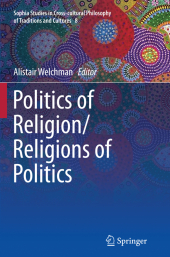 Neuerscheinungen 2016Stand: 2020-02-01 |
Schnellsuche
ISBN/Stichwort/Autor
|
Herderstraße 10
10625 Berlin
Tel.: 030 315 714 16
Fax 030 315 714 14
info@buchspektrum.de |

Alistair Welchman
Politics of Religion/Religions of Politics
Herausgegeben von Welchman, Alistair
Softcover reprint of the original 1st ed. 2015. 2016. xiii, 191 S. 235 mm
Verlag/Jahr: SPRINGER NETHERLANDS; SPRINGER 2016
ISBN: 940240810X (940240810X)
Neue ISBN: 978-9402408102 (9789402408102)
Preis und Lieferzeit: Bitte klicken
The liberal enlightenment as well as the more radical left have both traditionally opposed religion as a reactionary force in politics, a view culminating in an identification of the politics of religion as fundamentalist theocracy. But recently a number of thinkers-Agamben, Badiou, Tabues and in particular Simon Critchley-have begun to explore a more productive engagement of the religious and the political in which religion features as a possible or even necessary form of human emancipation. The papers in this collection, deriving from a workshop held on and with Simon Critchley at the University of Texas at San Antonio in February 2010, take up the ways in which religion´s encounter with politics transforms not only politics but also religion itself, molding it into various religions of politics, including not just heretical religious metaphysics, but also what Critchley describes as non-metaphysical religion, the faith of the faithless. Starting from Critchley´s own genealogy of Pauline faith, the articles in this collection explore and defend some of the religions of politics and their implications. Costica Bradatan teases out the implications of Critchley´s substitution of humor for tragedy as the vehicle for the minimal self-distancing required for any politics. Jill Stauffer compares Critchley´s non-metaphysical religiosity with Charles Taylor´s account of Christianity. Alistair Welchman unpacks the political theology of the border in terms of god´s timeless act of creation. Anne O´Byrne explores the subtle dialectic between mores and morality in Rousseau´s political ethics. Roland Champagne sees a kind non-metaphysical religion in Arendt´s category of the political pariah. Davide Panagia presents Critchley´s ethics of exposure as the basis for a non-metaphysical political bond. Philip Quadrio wonders about the political ramifications of Critchley´s own ´mystical anarchism´ and Tina Chanter re-reads the primal site in the Western tradition at which the political and the religious intersect, the Antigone story, side-stepping philosophical interpretations of the story (dominated by Hegel´s reading) by means of a series of post-colonial re-imaginings of the play. The collection concludes with an interview with Simon Critchley taking up the themes of the workshop in the light of more recent political events: the Arab Spring and the rise and fall of the Occupy movement.
Table of Contents
Acknowledgments
Abbreviations
Contributors
Chapter 1
Introduction
Alistair Welchman
Chapter 2
You are not your own
On the Nature of Faith
Simon Critchley
Chapter 3
Politics, Anthropology, Religion
Religious Particularism, Anti-Somatism and Elitism in ´Mystical Anarchism´
Philip Quadrio
Chapter 4
Border Sovereignty
Alistair Welchman
Chapter 5
The Gossip Circles of Geneva: Morals, Mores and Moralizing in Political Life
Anne O´Byrne
Chapter 6
Nihilists, Heroes, Samaritans and I
The Question of Moral Motivation in Secular Politics
Jill Stauffer
Chapter 7
Exposures and Projections
Simon Critchley´s Ethics of Appearances
Davide Panagi
Chapter 8
Simon Critchley´s Problem of Politics and Hannah Arendt´s Idealism for the USA
Roland Champagne
Chapter 9
The World as Farce
Costica Bradatan
Chapter 10
Exhuming the Remains of Antigone´s Tragedy
The Encryption of Slavery
Tina Chanter
Chapter 11
Politics of Religion/Religions of Politics
or Paul and Occupy
Simon Critchley and Alistair Welchman


